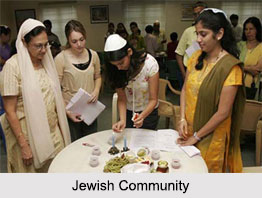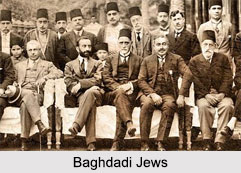 The Indian culture is known for its relative placidity, its acceptance of diversity and its inherent communalism, which have over the years provided many communities along with the Jews a sanctuary. As per the history of Jews in India, the religion of Judaism was one of the first foreign religions to arrive in the country.
The Indian culture is known for its relative placidity, its acceptance of diversity and its inherent communalism, which have over the years provided many communities along with the Jews a sanctuary. As per the history of Jews in India, the religion of Judaism was one of the first foreign religions to arrive in the country.
The Jewish community in India was at its peak in the mid 1940s at around 20,000 but the population gradually started to decline after Israel came into effect in 1948. Currently, there are seven Jewish communities in India:
Kochi Jews: Known to be one of the oldest Indian Jewish communities, the Kochi Jews settled in the erstwhile Kingdom of Cochin in South India, which is now currently part of the state of Kerala. The first Jews in the country arrived in 12th century in South India and legend states that they moved to the country after the destruction of their first temple during the siege of Jerusalem. These Jews were warmly received by Cheraman Perumal, the ruler of the Chera dynasty.
The Kochi Jews had a close relationship with the Indian rulers, who granted their Jewish leader Joseph Rabban the rank of prince over the Jews of Kochi. The Indian rulers granted them the rights to 72 free houses, the Jews were given the liberty to live freely and build synagogues. In 1524, when the Muslims attacked the wealthy Jews of Cranganore, they were given shelter by the Kochi Royal family and the Hindu king exempted the Jews of taxation. Kochi saw a variety of Jewish communities starting from Malabari, Paradesi to Madrasi.
 Madras Jews: Arrived in British India during the 16th century, the Madras Jews made their way to India after their expulsion from Iberia in 1492. Most of the Madras Jews were coral merchants from Leghorn, the Caribbean, London, and Amsterdam who were of Portuguese origin and belonged to the Henriques De Castro, Franco, Paiva or Porto families. These Jews could speak Ladino, which is basically Spanish or Judeo Spanish and after they settled in India, they learned Tamil and Judeo Malayalam from the Malabar Jews.
Madras Jews: Arrived in British India during the 16th century, the Madras Jews made their way to India after their expulsion from Iberia in 1492. Most of the Madras Jews were coral merchants from Leghorn, the Caribbean, London, and Amsterdam who were of Portuguese origin and belonged to the Henriques De Castro, Franco, Paiva or Porto families. These Jews could speak Ladino, which is basically Spanish or Judeo Spanish and after they settled in India, they learned Tamil and Judeo Malayalam from the Malabar Jews.
Bene Israel: One of the historic communities of Jews in India, the Bene Israel was formerly known as the Shanivar Teli caste in India. Ancient historic records suggest that the ancestors of the Bene Israel belong to one of the Lost Tribes of Israel. Bene Israel communities and synagogues are situated in Pen, Mumbai, Alibaug, Pune and Ahmedabad with smaller communities scattered around India.
Mumbai Jews: Due to the erstwhile Bombay"s economic opportunities in the 18th century, the Jews started to settle in the city during that time. The Jewish community in Bombay consisted of three distinct communities: the first being the Baghdadi Jews of Israel, who arrived in 1730, then there was the Bene Israel Jews of Konkan, who moved to the city in 1746 and lastly it is the Kochi Jews of Malabar. Currently, there are less than 4000 Jews in Mumbai and about 8 synagogues.
Baghdadi Jews: These were the Jews who primarily came from Baghdad, Basra and Aleppo during the European rule in India. The Baghdadi Jews were traders mainly of jute and tea, and were one of the most prosperous communities in the city of Surat, where they first settled. Over the years, their community has spread beyond Mumbai to other parts of India, including in Kolkata.
Bnei Menashe: Originally head-hunters and animists, the Bnei Menashe converted to Christianity at the beginning of the 20th century, but began converting to Judaism in the 1970s. They belong from the north eastern states of Mizoram and Manipur and have a total strength of about 9,000 people. They are also one of the descendants of the Lost Tribes of Israel and practise a biblical form of Judaism.
Bene Ephraim: A small group of Telugu speaking Jews in eastern Andhra Pradesh, the Bene Ephraim have been practising Judaism in India since the early 1990s. They claim to be descendants of the Tribe of Ephraim, of the Ten Lost Tribes.
Most of the Jews have migrated to Israel and currently, the largest community of Indian Jews can be found in Mumbai with a total strength of about 5,000 people.









